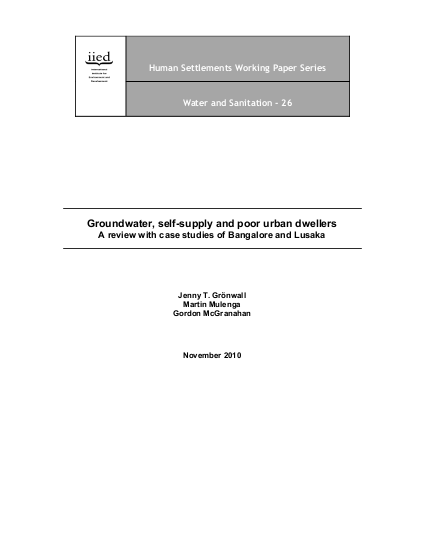A review with case studies of Bangalore and Lusaka

The objectives of this review are: • to explore the extent to which urban dwellers, and especially those living in lowincome areas, depend directly and indirectly on groundwater • to explore the difficulties they face as a result • to raise awareness of and emphasise the need for better integration of groundwater in the planning and management of urban water resources. The paper is based on a review of literature, substantiated by two case studies of Bangalore, India, and Lusaka, Zambia, and discussions with experts. The study on Bangalore builds on PhD and post-doctoral research carried out by Jenny Grönwall during six field trips between 2005 and 2007 (Grönwall 2008) and in 2009. The Bangalore study included a survey of close to 300 households. The Lusaka study builds on research conducted by Martin Mulenga during field trips in 2004 (Mulenga, Manase et al. 2004) and 2010. In both cities, views were sought from people in the relevant authorities, NGOs and slum/low-income settlement areas. Field trips also allowed for observations of some of the development over the past four to six years, as well as insights into the general situation of other Indian and Zambian cities.
Resource collections
- UN Habitat - Urban Response Collection
- Urban Response - Urban Crisis Preparedness and Risk Reduction
- Urban Response Collection - Community Engagement and Social Cohesion
- Urban Response Collection - Economic Recovery
- Urban Response Collection - Environment and Climate Change
- Urban Response Collection - Housing, Land and Property
- Urban Response Collection - Urban Crisis Response, Recovery and Reconstruction
- Urban Response Collection - Urban Resilience